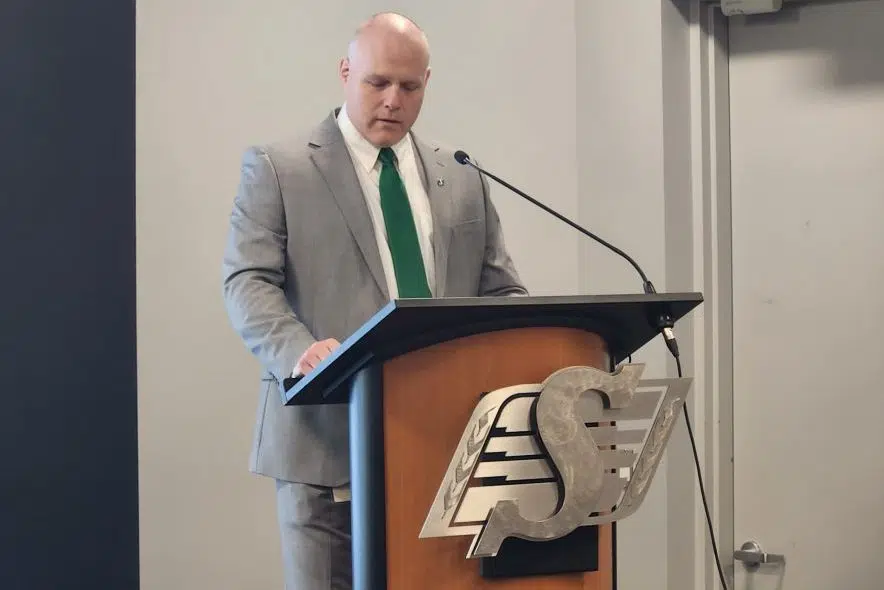The Grey Cup proved to be a touchdown when it comes to the Saskatchewan Roughriders’ bottom line.
The CFL club held its annual general meeting Wednesday, when it reported a total net income of $7,184,928 for the 2022-23 season — $3,883,046 from the club’s operating income and an additional $3,301,882 from hosting the Grey Cup.
Due to the CFL championship game being played at Mosaic Stadium, the Riders saw an increase in profits from the 2021-22 financial year, which was $3,883,291 with a shortened CFL season.
The total income from the Grey Cup was $8,254,704 with the CFL getting its 60 per cent share ($4,952,822).
“It took four years to get there, however it was a great experience to finally host the 2022 Grey Cup Festival and the 109th Grey Cup game,” said Kent Paul, the Riders’ chief financial officer.
The club indicated president-CEO Craig Reynolds was under the weather and was unable to attend Wednesday morning’s media briefing.
The financial success from the past two seasons have helped the Riders recoup the losses they saw due to the cancelled 2020 CFL season. The CFL team lost $8,371,601 in 2020-21.
Saskatchewan made back a chunk of that from the 2021-22 financial year and recovered the rest of the lost profit with this past season’s revenues backed by a strong Grey Cup performance.
“Here we are, two years later, and I’m pleased to announce strong financial results for the club. The opportunity to play a full season, along with strong support from our fans, partners and stakeholders, have allowed us to recover from the financial challenges we faced not too long ago,” Paul said.
While the club saw the benefits of playing a full season for the first time since 2019, gate receipts were down when compared to other full years.
In the 2019-20 financial year, the Riders recorded $17,099,400 in gate receipts. During the shortened season in the 2021-22 financial year, the team received $11,116,827 from the gate.
Last season, the team reported $15,939,738 from the gate from playing 10 home games.
Paul cited changing consumer habits, inflationary costs, and poor on-field performance as a reason for the drop.
“I think it’s a bit of both. We have realized that post-pandemic, people have created different habits,” Paul said. “They might be more comfortable staying home and watching the game from home because we all pretty much lived at home for 12 to 18 months.
“Strong on-field performance assists (gate revenue), but that’s where we look at what we can do as a club and supporting the football side – looking at affordability across the board and hoping the fans will come to the games this year and we will see success.”
The club has seen a drop in season-ticket sales this year but Paul was unable to provide an exact number. He said this sort of drop is normal for a team after hosting the Grey Cup.
“We’re down a little bit,” Paul said. “The factors we are hearing are similar to economic factors, and just the world we are in right now.
“That’s everything we are trying to do around making it as affordable as we can and as entertaining as we can for fans to come to games because it is an important piece for us.
“I wouldn’t say (the dropoff) is bigger than normal. We compare ourselves to other recent hosts and I think we are similar to what they’ve seen. It’s something we were expecting and managing through.”
The Riders later clarified that while season tickets are still for sale, they are down about 10 per cent from pre-pandemic levels.
According to a gambling.com survey, the Riders have the most expensive CFL game day for fans due to higher ticket prices and parking prices compared to other CFL teams.
Paul said the team has put a focus on helping make game days affordable for fans. That includes the family pack, which goes for $99.
“(Getting) two adults and two kids to come to a professional entertainment sporting event for $99 I think is a good deal,” Paul said. “This year we are trying to make it as affordable as we can, recognizing we aren’t immune to the inflationary factors as well.”
While the club has introduced a $5 menu and family meal packs, some items have seen a rise in price, such as alcoholic beverages.
“We’re trying to manage the input costs that are going up tenfold in terms of some of the costs. We have to balance that with our partners again,” Paul said. “When you look at alcohol prices, tax increases occur and natural increases in the product itself.
“We try and look at where we can balance it overall. At the same time, we tried to manage the best we can on the food costs and that they didn’t increase significantly. We introduced the $5 menu item, we also have family meals – for $35 you can get an entire meal for your family – which we think is great value in the stadium.
“We’re not immune to those increases in costs so we try to balance where we have to increase versus where we can maybe find some affordability.”
The club saw a drop in merchandise sales – from $4,513,718 in 2021-22 to $3,873,216 in 2022-23 – but was able to more than make up for the drop in Grey Cup merchandise, which brought the club $1,005,898.
After expenses for the merchandise are taken into account, the team recorded a profit of $771,131.
The biggest rise in expenses came from sponsorship, which included increased costs from the consolidation of sponsorship assets with the CFL – an increase from $1,292,442 to $4,328,933.











